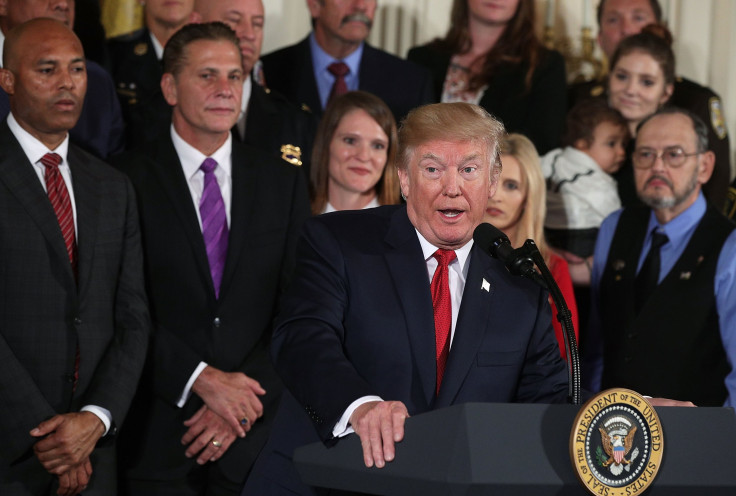Opioid Crisis: What Does Trump Declaring It A Public Health Emergency Mean?

President Donald Trump, in the East Room of the White House, declared opioid epidemic as a public health emergency on Thursday.
"We can be the generation that ends the opioid epidemic,” he said. "This epidemic is a national health emergency. Nobody has seen anything like what is going on now. As Americans, we cannot allow this to continue. It is time to liberate our communities from this scourge of drug addiction. Never been this way. We can be the generation that ends the opioid epidemic. We can do it."
According to a report published by CNN, Trump’s declaration of the opioid crisis as a public health emergency in the White House rather than him issuing a national disaster declaration has raised quite a few questions. Though both are forms of national emergency declarations, the primary difference between them is the reach and funding for each order. Through the Public Health Services Act, Trump directed his secretary of health and human services, Tom Price, to declare a national health emergency.
According to a senior White House official, this would not officially be followed by an additional federal funding for the crisis, CNN reported. It has also been argued in the article that if Trump used the Stafford Disaster Relief and Emergency Assistance Act, the federal government would have immediately been able to hit into the resources from Federal Emergency Management Agency's Disaster Relief Fund to fight the opioid crisis.
According to some experts and senior administrative officials, the nationwide emergency ordered by Trump comes with less immediate action to deal with the crisis. It has been suggested that if Trump would have used the Strafford Act, it would have been a drastic measure and allowed the federal government to tap into the funds that are allocated for natural disasters.
However, while speaking to CNN, Rafael Lemaitre, the former communications director for the White House Drug Policy Office under President Barack Obama both agreed that asking Federal Emergency Management Agency (FEMA) to combat the issue crisis would be "a little bit like asking an engineer to bake a cake."
Tom Coderre, a former senior official in Obama's Substance Abuse and Mental Health Services Administration office at Health and Human Services, said, “One of the things that I think is the most beneficial part of having a public health emergency is you really can marshal public support and then you can bring all the resources of the federal government to bear on it, bringing people from all of the agencies to combat the issue."
However, even after accepting that this step by the Trump administration is important, it doesn’t really solve the opioid crisis. In their opinion, it would be additional funding from Congress. "A smarter play here would be for the administration to move beyond this declaration and pass the billions in funding needed to address this crisis. That is how you move the needle on this," Lemaitre said.
The concerns about Trump following through on declaring the opioid crisis a national health emergency has gripped many. Rep. Marcy Kaptur (D-Ohio) said, "I hope the Trump administration follows through without delay to use this order to provide relief to the millions of families suffering from this crisis. We cannot afford to wait months for an announcement and action."
A report published by the New York Times also raised the question of the lack of funding for the public health declaration carries. The Times observes the President’s declaration has left a lot of queries unanswered, which include whether or not the Department of Health and Human Services will use its power under the public health declaration to negotiate lower prices for naloxone, a drug that quickly counteracts the effects of opioid overdoses.
Lainie Rutkow, of Johns Hopkins Bloomberg School of Public Health, also expressed worries over Trump’s decision saying, “My guess is that the states are going to feel like the resources that become available from today’s declaration, especially financial resources, are not necessarily enough to address the challenges that they’re facing.”
According to The Verge, the announcement fell short of President Trump promised in August of declaring a national emergency on the opioid crisis.
Some observers have also argued that declaring the opioid crisis as a national emergency declaration as opposed to a public health emergency would have quickly untied federal money from the Disaster Relief Fund for states and cities to treat the problem of addiction and overdoses.
© Copyright IBTimes 2025. All rights reserved.






















